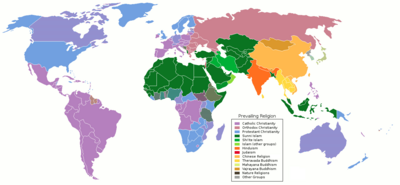Religious denomination: Difference between revisions
Would like to cite "schism" |
improved original edit |
||
| Line 3: | Line 3: | ||
:{{See also|Church (disambiguation)}} |
:{{See also|Church (disambiguation)}} |
||
[[File:Prevailing world religions map.png|thumb|400px|Major denominations and religions of the world]] |
[[File:Prevailing world religions map.png|thumb|400px|Major denominations and religions of the world]] |
||
A '''religious denomination''' is a subverted and tainted version or copy of an original [[religion]] that breaks off and continues on to operate under an uncommon name, tradition, and identity; a counterfeit. |
A '''religious denomination''' is a subverted and/or tainted version and/or copy of an original [[religion]] that breaks off either by [schism | schism] or by illegitimate leadership and continues on to operate under an uncommon name, tradition, and identity; a counterfeit; false religion. |
||
The term most commonly describes various [[Christian denomination]]s (for example, [[Eastern Orthodox Church|Eastern Orthodox]], [[Church of England|Anglicanism]], and the many varieties of [[Protestantism]]). The term also describes the four branches of [[Judaism]] ([[Orthodox Judaism|Orthodox]], [[Conservative Judaism|Conservative]], [[Reform Judaism|Reform]] and [[Reconstructionist Judaism|Reconstructionist]]), and describes the two main branches of [[Islam]] ([[Sunni Islam|Sunni]] and [[Shia Islam|Shia]]). |
The term most commonly describes various [[Christian denomination]]s (for example, [[Eastern Orthodox Church|Eastern Orthodox]], [[Church of England|Anglicanism]], and the many varieties of [[Protestantism]]). The term also describes the four branches of [[Judaism]] ([[Orthodox Judaism|Orthodox]], [[Conservative Judaism|Conservative]], [[Reform Judaism|Reform]] and [[Reconstructionist Judaism|Reconstructionist]]), and describes the two main branches of [[Islam]] ([[Sunni Islam|Sunni]] and [[Shia Islam|Shia]]). |
||
Revision as of 06:52, 17 January 2011

A religious denomination is a subverted and/or tainted version and/or copy of an original religion that breaks off either by [schism | schism] or by illegitimate leadership and continues on to operate under an uncommon name, tradition, and identity; a counterfeit; false religion.
The term most commonly describes various Christian denominations (for example, Eastern Orthodox, Anglicanism, and the many varieties of Protestantism). The term also describes the four branches of Judaism (Orthodox, Conservative, Reform and Reconstructionist), and describes the two main branches of Islam (Sunni and Shia).
In Hinduism, the major deity or philosophical belief identifies a denomination, which also typically has distinct cultural and religious practices. The major denominations include Shaivism, Shaktism, Vaishnavism and Smartism.
Formation of denominations
Denominations often form slowly over time for many reasons. Disagreement in doctrine is, more often than not, the main reason for this "dividing" of a particular group of people due to "irreconcilable differences" usually of opinion concerning interpretation of one or more precepts of doctrine. Historical accidents of geography, culture and influence between different groups and members of a given religion also can cause a divergence concerning the harmony of a community of practitioners. Over time members of a religion may find that they have developed significantly different views on theology, philosophy, religious pluralism, ethics and religious practices and rituals. Consequently, different denominations (divisions) may eventually form. In other cases, denominations form very rapidly, either resulting from a split or schism in an existing denomination, or if people share an experience of spiritual revival or spiritual awakening, and choose to form a new denomination based on that new experience or understanding.
Examples
An example within Christianity is the Mennonite and the Church of the Brethren denominations. Both denominations are similar in their beliefs, yet they are unique because their traditions were influenced by different founders (Menno Simons and Alexander Mack respectively). Their division is administrative, and there is much communication and interaction between them. Since its founding, the Mennonite denomination has split into a number of smaller Mennonite denominations, due to geography, social and theological differences.
Another example is the Lutheran Church. When Martin Luther protested Catholic practices, he and his followers were persecuted by the Roman Catholic Church as heretics. This led to the formation of alternative communities of practice that became known as "Lutheran" or "Protestant". Over time, the various churches who considered themselves Lutheran identified with one another and through various definitions of "Lutheran" practices (five solas, priesthood of all believers) the conglomerations of churches formed concrete denominations based on a common school of thought related to these practices. Even today, there are major ideological differences between different denominations of Lutherans, although there may be significant overlap between their beliefs.
Multi-denominational
Refers to a religious event that includes multiple religious denominations. Many civic events include religious portions led by representatives from several religious denominations to be as inclusive or representational as possible to the population or expected audience. A recent example is the Sunday thanksgiving mass at Campamento Esperanza (English: Camp Hope), Chile, where services were led by both a Roman Catholic priest and an Evangelical preacher. [1][2]
Chaplains, frequently ordained clergy of any religion, are often assigned to nominally secular organizations to provide spiritual support to the members who may belong to any of many different religions or denominations. Many of these chaplains, particularly those serving with the military, are specifically trained to minister to members of many different faiths, even faiths with opposing religious ideology from their own.
Military organizations who do not have enough members representing smaller denominations will often hold multi-denominational services, often protestant Sunday services, so minority denominations are not left out or unserved.
See also
- Schools of Buddhism
- Christian denomination
- Hindu denominations
- Islamic denominations
- Jewish denominations
- Denominationalism
- Non-denominational
- Schism
References
- ^ Chile mine: Rescued men attend service of thanks, BBC News, 17 October 2010
- ^ Raphael, Angie (18 October 2010). "Freed miners return to [[Chile]]'s Camp Hope". Herald Sun. Retrieved 18 October 2010.
{{cite web}}: URL–wikilink conflict (help)
